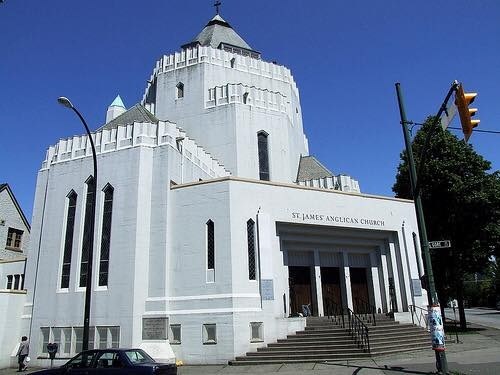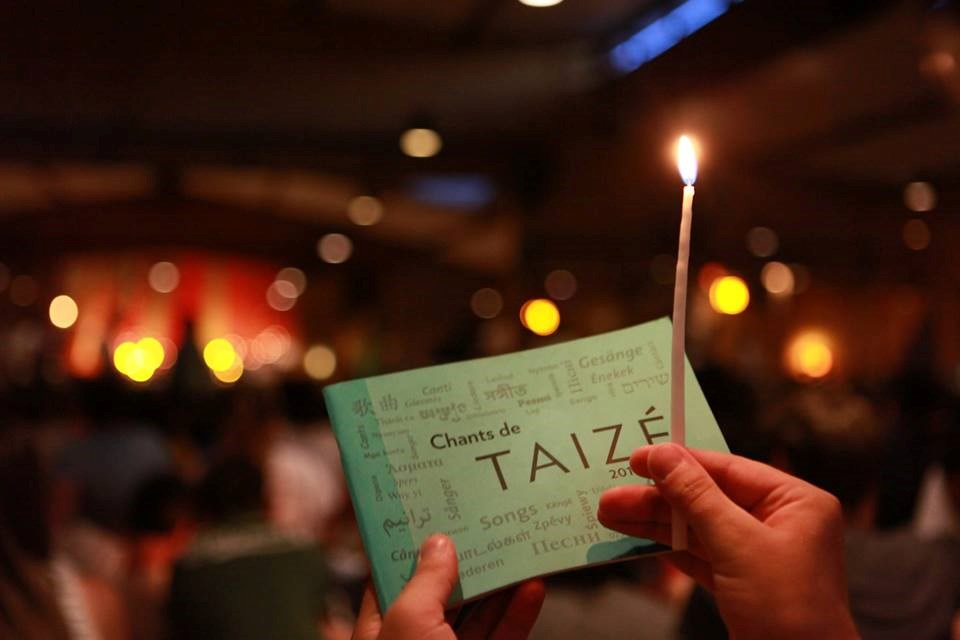Welcome to Leap of Faith, a new weekly blog hosted by veteran religion reporter Alicia Ambrosio, exploring faith, spirituality and Vancouver's sacred spaces.
I’m standing on the corner of East Cordova and Gore streets looking at the facade of a church that looks very much shuttered for the evening. “It looks closed,” my astute sidekick observes as we climb the steps of St. James Anglican Church, trying not to disturb the local resident who has tucked in for the night at one end of the stairs. Indeed, the front door is closed.
We try the sides of the church and, on Cordova Street, find a sign with an arrow pointing towards an open gateway. Cell phone flashlights in hand we follow the walkway until we reach a courtyard and see a warm, glowing light flooding from an open door. This is the entrance to the Blessed Sacrament chapel at St. James – a space reserved for weekday masses and, tonight, for a Taizé prayer gathering.

The Taizé prayer style gets its name from Taizé, France, where a religious community made up of men from different Christian denominations live and work. The Taizé community hosts week-long retreats for young people and has developed a unique style of candle-lit prayer based on scripture, short, simple songs in multiple languages, and long periods of silence.
Inside the chapel at St. James church, seats and low stools have been arranged in a semi-circle around a cluster of candles on the floor. A young woman with a short crop of dark hair pads around barefoot lighting the candles on the floor and the altar, while three young boys entertain themselves on the floor with unlit candles. She introduces herself as Elisha and invites us to take a seat while she finishes setting up.
Just when it looks like tonight’s session will be an intimate affair, Elisha turns off the overhead lights, sits on a cushion by the candles, and a group of about half a dozen people silently flood into the chapel. My friend whispers, wide-eyed, “They’re all young people!!”
There are a few moments of silence, before Elisha pulls a large Bible towards her and reads Psalm 94. The reading is followed by more silence, and then the most glorious a cappella music begins. The song is two lines in Latin: “Ubi Caritas et Amor, Ubi Caritas Deus Ibi Est” (meaning “where charity and love are, God is there”) and the melody is just two or three notes repeated over and over. Soon everyone in the chapel is singing, the sound gently bouncing off the high ceiling and filling the cool, candlelit air.
I’m not a touchy-feely person of faith, but at a certain point I was surprised to realize my cheeks were wet and my eyes were blurry. At the end of the evening I noted I was not the only person in the chapel who experienced such an effect.
The pattern – a Bible passage, silence, then two or three similarly simple songs – is repeated three times over the course of an hour. After the last song is sung, the lights stay off and the candles stay lit and people get up and leave when they feel ready. “I usually let people stay for quite a while after,” Elisha tells me as we stand in the courtyard chatting.
Taizé prayer evenings have been taking place at St. James on the first Wednesday of every month for almost two years.
The Taizé Community was founded by Roger Schutz in 1949. Today the community is made up of more than a hundred men who make promises to live simple, celibate lives. Most members of the community live in Taizé, while some have been asked to live in disadvantaged parts of the world.
Today the community in France hosts thousands of visitors every year, the vast majority of them young people. Living is simple: dorms or tents. Guests are asked to do regular chores and take part in a variety of workshops, on topics like, “Why poverty is not inevitable and how can we prevent it?” or, “Christians and Muslims living together today” and, “The world changes, ethics remain, what’s my place in that?”
Three times a day church bells sound and everyone gathers together for prayer in the typical Taizé style.
Elisha had a chance to visit the Taizé community a few years back. “I was expecting this contemplative retreat experience, and then bus loads of French high school students arrived and I thought, ‘Oh no.’” To her surprise, the teens kept each other in line and took part wholeheartedly in the community chores, workshops and prayers. The experience drove home for Elisha the belief that all people, especially young people, yearn for peace, stillness and the chance to connect with something bigger than themselves.
Back in Vancouver she felt moved to make Taizé prayer available locally. She knew the chapel at St. James well, having attended the church for many years, and was able to get permission to use the chapel once a month. With the help of a pastor from Artisan Church, a community church based in Railtown, she began hosting the monthly Taizé nights.
Elisha’s only hope was that “in the business of life filled with constant distraction and stress” she could provide a way for people to stop and be still. “We’re constantly distracted, and it’s only when you’re not distracted that you realize you’re unhappy. And when you realize that, you start to ask, ‘What else is there?’ and the only answer is that there has to be something bigger than us.”
In the space and time provided by an evening of Taizé prayer, she hopes people will start asking those questions, and find answers.
• Taizé prayer evenings are held at St. James Anglican Church the first Wednesday of every month at 7:30 p.m., in the chapel. St. Andrews United Church is hosting a Taizé contemplative evening on Oct. 15 and Nov. 19.
• After graduating from Simon Fraser University with a degree in communication, Alicia moved to Rome, where she got an unexpected start covering religion. Stints in Toronto, Madrid and Toronto followed, culminating with her return home to the West Coast. Alicia has worked as a television producer and host, and is currently a freelance writer for Aleteia and Catholic News Service, as well as Leap of Faith, the Westender's blog on faith and spirituality in Vancouver.



